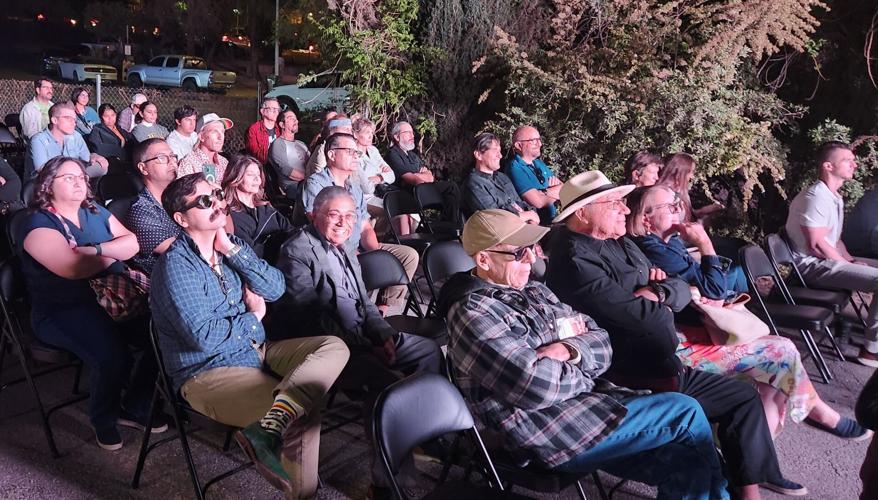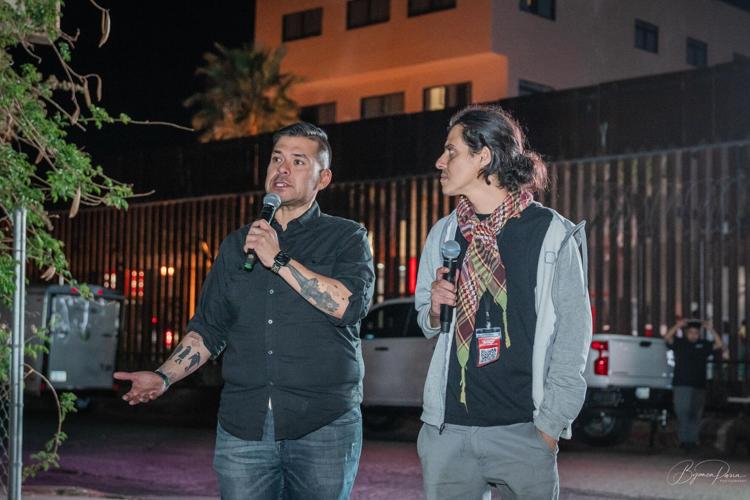
Gilberto ‘Gil’ Maldonado, the original saxophonist for Los Apson, watches himself on the big screen in the documentary “Señor Apache,” during the Nogales International Film Festival.
Palm trees swayed in the breeze in Nogales, Sonora, Mexico on Thursday as the sun started to set, towering above the rust brown border fence lined by coils of barbed wire. Just below, on the Mexico side, a crew put together an LED screen and set up green plastic chairs in preparation for a film screening along the border wall.
On the U.S. side, black folding chairs covered a parking lot across the street from the fence. An LED screen was already set up on the otherwise quiet residential area near International and West streets, just a few hundred feet from the border crossing.
The setup was for the Film on the Fence screening, part of the Nogales International Film Festival that took place over the weekend. The screening shows the same films on both sides of the border, with the goal of uniting people from both communities through arts and culture.
The Nogales International Film Festival was held from Wednesday through Saturday in Nogales, Sonora, Mexico, and in Nogales, Arizona, a transnational area often called “Ambos Nogales,” or both Nogales. The festival featured short films and feature films screened not just on the border, but also in theaters in the twin cities — Oasis Cinema 9 in Arizona and the Nogales Cultural Center in Sonora.
“The idea is to erase the border,” said Francisco Landin, co-director of the Nogales International Film Festival. “It’s not activism. We have an opportunity, with this event, to erase the border and unite people in Ambos Nogales. So we don’t want everything to be about immigrants, about the border. We want to show beautiful films that entertain.”
Co-director Oscar Rene Coronado agreed, saying the event aimed to entertain and promote culture and education.
The festival was founded in 2010 by Sam Saunders, an art collector and owner of Holler and Saunders, an antique and contemporary furniture store in Nogales, Arizona. With some breaks during the pandemic, this marked the 13th edition of the festival. It was initially called the Santa Cruz County Film Festival and later renamed the Borderland Film Festival. Two years ago, the Southern Arizona Film Society took over as organizers.

Francisco Landin, co-director of the Nogales International Film Festival talks to Film on the Fence attendees after a screening on Friday, May 2, 2025, in Nogales, Arizona, while co-director Oscar Rene Coronado looks on. The Film on the Fence screening shows the same films on both sides of the border.
Landin and Coronado decided to rebrand this year, dubbing it the Nogales International Film Festival to showcase the art scene and cultural diversity that already exists in the twin cities of Nogales, they said.
This year’s festival also lasted longer than previous years, starting on Wednesday with the Youth Festival, where students of the Southern Arizona Film Society presented their work on the big screen to family and friends. The film society mentors aspiring filmmakers throughout the year, teaching them how to write, produce and direct films.
One of the biggest challenges of bringing the festival back after the pandemic was finding the financial support to host and grow it, Coronado said.
Imfoculta in Sonora, the Municipal Institute for Promotion of Culture and Arts in Nogales, has supported the festival throughout the years and this year covered the cost of the Film on the Fence screening in Mexico.
An inclusion of culture in every film
On Thursday, next to the elevated LED screen on the U.S. side, Gilberto ‘Gil’ Maldonado, Luis Fernando Pacheco Gonzalez and Nicolas Gutierrez took photos on a red carpet in front of a photo backdrop promoting the festival while they waited for the first feature film to start.
Pacheco Gonzalez directed the first feature film that would be shown that night, “Señor Apache,” a documentary about the legacy of Los Apson, a famous rock band from the 60s.
Maldonado is the original saxophonist of Los Apson and was featured in the film, along with the other original musicians and some of their family members. Los Apson was formed in 1957 in Agua Prieta, Sonora, another border town a few hours east of Nogales. They quickly became famous, playing timeless rock songs with a similar sound to other internationally famous bands of the time, like The Beatles.
Pacheco Gonzalez, like many Latino kids from the 90s, grew up listening to Los Apson. Growing up surrounded by musicians and admiring the band, he was inspired to tell their story. He titled the documentary after one of the band’s famous song titles.
He said he believes the story of Los Apson “is the biggest rock n’ roll story there is… At least in Sonora.” It’s a story that needed to be told, he added.
“It’s a film that invites people to think about the redemption of the members of Los Apson,” Pacheco Gonzalez said. “It invites (people to consider) second chances and to value the legacy of Los Apson.”
The independent film, produced through Cauce Cine and Tumbacasa, hasn’t finalized production. The Thursday screening was an early showcase of the film, but Pacheco Gonzalez and the film’s producer, Gutierrez, said they are in the process of raising funds and looking for sponsors in order to complete post-production work, like mastering sound and paying music royalties.
Luis Ochoa lives on International Street, up the hill from where the movie was screened. It’s his third time attending Film on the Fence. If he sees the setup on his way home, he walks down the hill to watch the film.
"I'm intrigued by the concept of what they're doing,” Ochoa said. “I like that they're including culture because I know all the films they've shown are based on Mexican culture."
Cristian Proa, a writer and director, traveled to Nogales from Miami, Florida. Born in Mexico City, Proa wanted to showcase Mexico as a place of healing. That was one of his inspirations for “Mephisto,” a film about a woman who travels to Mexico as she grieves and heals from the loss of her parents.
Proa had never been to the Nogales border. When he learned about the festival, through one of the film’s actors, and about Film on the Fence, “it blew my mind,” he said.
“For me it’s very symbolic and a very powerful thing projecting in both countries,” Proa said. “It’s an amazing idea.”
Stephanie Casanova is an independent journalist from Tucson, Arizona, covering community stories for 10 years. She is passionate about narrative, in-depth storytelling that is inclusive and reflects the diversity of the communities she covers. She recently covered the criminal justice beat at Signal Cleveland, where she shed light on injustices and inequities in the criminal legal system and centered the experiences of justice-involved individuals, both victims and people who go through the system and their impacted loved ones.

















(0) comments
Welcome to the discussion.
Log In
Keep it Clean. Please avoid obscene, vulgar, lewd, racist or sexually-oriented language.
PLEASE TURN OFF YOUR CAPS LOCK.
Don't Threaten. Threats of harming another person will not be tolerated.
Be Truthful. Don't knowingly lie about anyone or anything.
Be Nice. No racism, sexism or any sort of -ism that is degrading to another person.
Be Proactive. Use the 'Report' link on each comment to let us know of abusive posts.
Share with Us. We'd love to hear eyewitness accounts, the history behind an article.